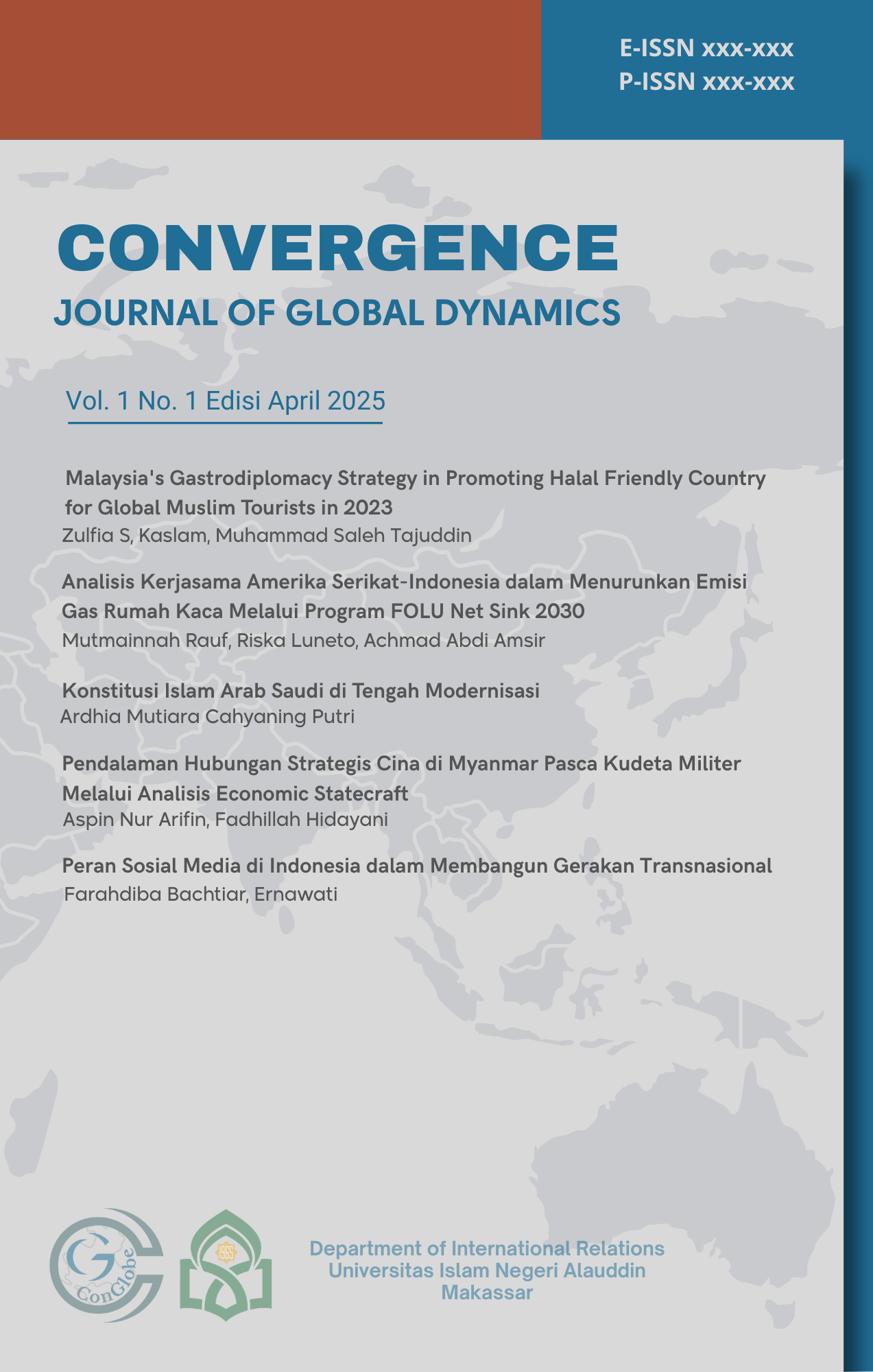Peran Sosial Media di Indonesia dalam Membangun Gerakan Transnasional
Keywords:
human trafficking, Indonesian migrant workers, Nusa Tenggara BaratAbstract
This article examines victims of human trafficking from the province of Nusa Tenggara Barat (NTB). Existing research on human trafficking has been studied in general terms and rarely includes Indonesian migrant workers. In fact, perpetrators of human trafficking targeted migrant workers. This research was conducted using a qualitative descriptive method and literature study which aims to describe human trafficking of migrant workers from NTB. In addition, this study analyzes underlying factors of human trafficking within the circle of migrant worker groups from the province of NTB. This article employs several concepts as analytical tools, such as the concept of human trafficking and transnational organized crime. This articles contributes to provide recommendation for policy makers in regulating Indonesian migrant workers.
References
Alvara Strategic Research. (2019). Behaviors and Preferences of Indonesian Millennial Consumers on E-Commerce Applications in 2019.
Annur, C. M. (2023). Pengguna Facebook di Indonesia Tembus 135 Juta Orang hingga April 2023, Peringkat Berapa di Dunia? Katadata. https://databoks.katadata.co.id/datapublish/2023/05/29/pengguna-facebook-di-indonesia-tembus-135-juta-orang-hingga-april-2023-peringkat-berapa-di-dunia
Auxier, B. (2020). Social media continue to be important political outlets for Black Americans. Pew Research Center. https://www.pewresearch.org/fact-tank/2020/12/11/social-media-continue-to-be-important-political-outlets-for-black-americans/
Belle Wong, J. D. (2023). Top Social Media Statistics And Trends Of 2023. https://www.forbes.com/advisor/business/social-media-statistics/#source
Belli, L., & Horten, M. (2022). Structural Power as a Critical Element of Social Media Platforms’ Private Sovereignty. In Constitutionalising Social Media. https://doi.org/10.5040/9781509953738.ch-006
Bjola, C. (2016). Digital diplomacy – the state of the art. Global Affairs, 2(3), 297–299. https://doi.org/10.1080/23340460.2016.1239372
Bjola, C., & Holmes, M. (2015). Digital diplomacy: Theory and practice. Digital Diplomacy: Theory and Practice, 1–238. https://doi.org/10.4324/9781315730844
Bowen, G. A. (2009). Document Analysis as a Qualitative Research Method. Qualitative Research Journal, 9(2), 27-40.
Braun, V., & Clarke, V. (2006). Using Thematic Analysis in Psychology. Qualitative Research in Psychology, 3(2), 77-101.
Creswell, J. W., & Creswell, J. D. (2018). Research Design Fifth Edition. In SAGE Publications India Pvt. Ltd (Issue 2).
Das, Kaushik, Michael Gryseesl, Priyanka Sudhir, K. T. T. (2016). Unlocking Indonesia’s digital opportunity.
Deane, J. (2015). A GOVERNANCE PRACTITIONER’S NOTEBOOK: ALTERNATIVE IDEAS AND APPROACHES. In Governance practitioners Network.
Dimas Jarot Bayu. (2021). Jumlah Pengguna Media Sosial di Dunia Capai 4,2 Miliar. Katadata. https://databoks.katadata.co.id/datapublish/2021/02/18/jumlah-pengguna-media-sosial-di-dunia-capai-42-miliar
Ding, J. (2020). Social Media: Threat to or Tool of Authoritarianism? https://hir.harvard.edu/social-media-threat-to-or-tool-of-authoritarianism/
DIPLO. (2021). Internet and social media: A focus on diplomacy - Diplo. https://www.diplomacy.edu/histories/internet-and-social-media-a-focus-on-diplomacy/
Dunbar, R. I. M. (2016). Do online social media cut through the constraints that limit the size of offline social networks? Royal Society Open Science, 3(1). https://doi.org/10.1098/rsos.150292
Feindt, G., Gissibl, B., & Paulmann, J. (2021). Introduction: Cultural sovereignty – claims, forms and contexts beyond the modern state. In Cultural Sovereignty beyond the Modern State. https://doi.org/10.1515/9783110679151-001
Guardian. (2022). Condolences and condemnation: Indigenous people and people of colour react to the death of Queen Elizabeth II | Indigenous Australians | The Guardian. https://www.theguardian.com/australia-news/2022/sep/10/condolences-and-condemnation-indigenous-people-and-people-of-colour-react-to-the-death-of-queen-elizabeth-ii
Ham, P. Van. (2010). Social power in international politics. https://books.google.com/books?hl=en&lr=&id=SGmMAgAAQBAJ&oi=fnd&pg=PP1&dq=Social+power+in+international+politics.+Routledge.+&ots=QBuOiNDXuT&sig=wttmLXu71enm_MnZGi96hKn0V24
Harris, B. (2013). Diplomacy 2.0: The Future of Social Media in Nation Branding. Exchange: The Journal of Public Diplomacy, 4(1), 17–32. https://surface.syr.edu/cgi/viewcontent.cgi?article=1032&context=exchange
K.Yin, R. (2018). Case study research and applications: Design and Methods. In Sage Publications: Vol. Sixth.
Katadata. (2021). Sensus penduduk 2020 penduduk indonesia didominasi gen z dan milenial. https://databoks.katadata.co.id/datapublish/2021/01/22/sensus-penduduk-2020-penduduk-indonesia-didominasi-gen-z-dan-milenial
Kementerian Kominfo. (2022). Mendigitalkan Indonesia. https://web.kominfo.go.id/sites/default/files/users/70/Laptah2021.pdf
Keohane, R. (2002). Power and governance in a partially globalized world. https://books.google.com/books?hl=en&lr=&id=mhrwsR83vPMC&oi=fnd&pg=PR11&dq=Robert+Keohane+Power+and+Governance+in+a+Partially+Globalized+World&ots=tdquFzHnLc&sig=ukOvFAMFMQj-2dDljmVBae7iY0Y
Keohane, R. O., & Nye, J. S. (2011). Power and Interdependence (4th ed.). Pearson.
Keck, M. E., & Sikkink, K. (1998). Activists Beyond Borders: Advocacy Networks in International Politics. Cornell University Press.
Klotz, A., & Prakash, D. (2008). Qualitative methods in international relations. Springer.
Kreps, S. (2020). Social Media and International Relations. In Social Media and International Relations. Cambridge University Press. https://doi.org/10.1017/9781108920377
Madu, L. (2018). Indonesia’s Digital Diplomacy: Problems and Challenges. Jurnal Hubungan Internasional, 7(1). https://doi.org/10.18196/hi.71121
Monika Winarnita, N. B. et al. (2020). et al. https://www.insideindonesia.org/gerakan-metoo-indonesia
Murthy, D. (2018). Introduction to Social Media, Activism, and Organizations. Social Media and Society, 4(1). https://doi.org/10.1177/2056305117750716
Pew Research Center. (2022). Social Media Seen as Mostly Good for Democracy Across Many Nations, But U.S. is a Major Outlier | Pew Research Center. https://www.pewresearch.org/global/2022/12/06/social-media-seen-as-mostly-good-for-democracy-across-many-nations-but-u-s-is-a-major-outlier/
Quiano, K., & Griffiths, J. (2016). Blasphemy protests: Indonesian police investigating Christian governor. https://edition.cnn.com/2016/11/15/asia/jakarta-governor-ahok-indonesia/index.html
Reuter, O. J., & Szakonyi, D. (2013). Online social media and political awareness in authoritarian regimes. British Journal of Political Science, 45(1), 29–51. https://doi.org/10.1017/S0007123413000203
Riyanto, G. P. (2022). Ucapan Duka untuk Ratu Elizabeth II Mengalir dari Bos-bos Teknologi. Kompas.Com. https://bit.ly/3g85pkA%0AiOS: https://apple.co/3hXWJ0L
Ross, A. S., & Rivers, D. J. (2020). Donald Trump, legitimisation and a new political rhetoric. World Englishes, 39(4), 623–637. https://doi.org/10.1111/weng.12501
Sadiki, L. (2019). The Arab Spring: The ‘People’ in International Relations. In L. Fawcett (Ed.), International Relations of the Middle East (Fourth Edi, pp. 339–367). Oxford University Press. https://doi.org/10.1093/hepl/9780198809425.003.0015
Sorce, G., & Dumitrica, D. (2022). Transnational dimensions in digital activism and protest. In Review of Communication (Vol. 22, Issue 3, pp. 157–174). https://doi.org/10.1080/15358593.2022.2107877
Sprinz, D. F., & Wolinsky-nahmias, Y. (2016). Models, Numbers, and Cases. Models, Numbers, and Cases. https://doi.org/10.3998/mpub.11742
Taylor, P. (2002). Global Communications, International Affairs and the Media Since 1945. Global Communications, International Affairs and the Media Since 1945. https://doi.org/10.4324/9780203429624/GLOBAL-COMMUNICATIONS-INTERNATIONAL-AFFAIRS-MEDIA-SINCE-1945-PHILIP-TAYLOR
Verrekia, B. (2017). Digital Diplomacy and Its Effect on International Relations. Independent Study Project (ISP) Collection, 30. https://digitalcollections.sit.edu/isp_collection
Waeterloos, C., Walrave, M., & Ponnet, K. (2021). Designing and validating the Social Media Political Participation Scale: An instrument to measure political participation on social media. Technology in Society, 64, 101493. https://doi.org/10.1016/J.TECHSOC.2020.101493
Wang, Y., Chatterjee, R., & Al, E. (2020). #MeToo is at a crossroads in America. Around the world, it’s just beginning. Washington Post. https://www.washingtonpost.com/opinions/2020/05/08/metoo-around-the-world/
Wendt, A. (1999). Social Theory of International Politics. Cambridge University Press.
Westcott, N. (2011). Digital Diplomacy: The Impact of the Internet on International Relations. SSRN Electronic Journal. https://doi.org/10.2139/SSRN.1326476
Wolfsfeld, G., Segev, E., & Sheafer, T. (2013). Social Media and the Arab Spring: Politics Comes First. The International Journal of Press/Politics, 18(2), 115 –137. https://journals.sagepub.com/doi/pdf/10.1177/1940161212471716
Yin, R. K. (2018). Case Study Research and Applications: Design and Methods (6th ed.). SAGE Publications.




